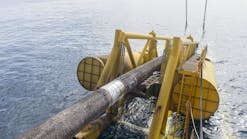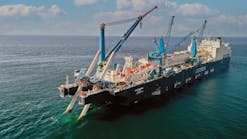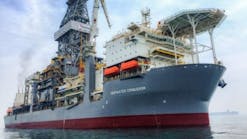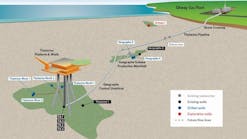Balancing safety with business performance can put some owners and operators in a precarious situation. The dilemma places them in a grey zone - juggling risks and rewards. But there has been no better time in the industry to feel confident about managing risk than today.
The industry has accumulated decades of successful experience operating in a variety of regions worldwide. Each region has its own set of technological challenges. The result is a deep "toolbox" of facilities for exploring and producing in the offshore environment.
And perhaps more important than the tools and techniques being developed is the change in the operational philosophy on the part of all parties involved in an offshore project. Specifically, classification societies serve as independent third-party guardians for the safety standards for the marine and offshore industry. The evolution of "class" can be described as commercially pragmatic, working with industry as an independent, objective body to understand the needs of owners and operators.
Partnership
The nature of the relationship between class societies and oil and gas clients is a partnership. Class has always recognized the relevant expertise of the industry in conducting business. The rule-making process of class has thus been a joint effort with industry to ensure the accuracy and appropriateness of our standards.
With the increasing role of floating production, many new non-marine players have become aware of the benefits of class. For instance, those players associated with the design of topside production facilities - when supported on a floating body at sea and subject to the hydrodynamic motions of the sea - are seeking guidance from class societies.
Class societies endeavor to work with all those involved on such projects to arrive at mutually agreeable requirements in the best interest of the safety of the asset, the people, and the environment, so critical project decisions can be made - not mandated.
The changing face of class now marks us as facilitators for a project and not labeled as a roadblock within the review process. This transition has resulted from an increasing number of projects involving class societies from the inception of a project's life cycle. Those operators who integrate classification in the early stages see bottom-line value.
Avoiding late changes
With fast-track projects now the norm, project teams need to make sure that their designs are fully compliant with all applicable regulatory and class requirements. Not doing so is a guarantee of later problems. Changes during the design phase obviously translate to cost savings after steel is cut if modifications are required at that time.
Class involvement during front-end engineering greatly facilitates awareness among team members as to possible pitfalls in meeting regulatory and class requirements. For many projects, class can act on behalf of the coastal and/or flag state, thus streamlining regulatory compliance by having these activities coordinated via a single entity. Even when delegations are not possible, class experience on previous projects supplies important input to the knowledge of the project team. Such practical experience also is valuable to the project team in general. There are, quite literally, thousands of years' worth of practical experience on other related projects that class brings to the table.
In working with project teams, a classification society, such as ABS, assesses how to facilitate new innovations while ensuring the safety of the installation. As technology progresses, class also is faced with the need to evolve its rules in response to this need. Where a new design may not specifically comply with a prescriptive requirement, ABS works with the designer to demonstrate an equivalent level of safety. Risk techniques are an increasing means of fulfilling this need.
As class embraces a variety of risk-based approaches, we are re-thinking the traditional prescriptive rules - based on prior experience - to bring a more open approach that allows the industry to comply with rules based on predicting behaviors - in particular, minimizing risk. The commercial benefit of this approach is that it allows operators to optimize dollars and resources by focusing capital on the technical areas of most concern.
Non-traditional approaches
Complex offshore processes and environments call for non-traditional approaches to the challenge of operating safely while pursuing the project's objectives. New regional and technological issues are challenging the systems more than ever before. Obviously, an approach and criteria for a North Sea project differs from one off Brazil or in the Gulf of Mexico.
In response, class societies are responding with the development of applicable risk-based rules and guidelines. This approach allows owners and operators to establish their own maintenance and inspection programs to meet their specific project needs.
It is important to note that even the prescriptive rules are in large part risk-based themselves as they embody the feedback from successful practice. The offshore industry enters the millennium confronted by more technological and environmental challenges than ever before. It is a positive sign to see its partners, such as class, changing to keep pace and anticipate the needs of the industry for the next decade and beyond.
Dr. Malcolm Sharples
Vice President - Offshore Project Development
ABS Group Inc.
This page reflects viewpoints on the political, economic, cultural, technological, and environmental issues that shape the future of the petroleum industry. Offshore Magazine invites you to share your thoughts. Send your manuscript to Beyond the Horizon, Offshore Magazine, Box 1941, Houston, TX 77251 USA. Manuscripts will not be returned.




